
(Photos: J.Maus and M.Andersen/BikePortland)
The densest major industrial park in Portland seems likely to lose its tiny transportation advocacy organization after a proposed funding shift from the Metro regional government.
The Swan Island Transportation Management Association currently relies on Metro for 59 percent of its revenue, with businesses based in the North Portland industrial park providing the remainder. In a round of grants announced Friday, Metro cut all its funding for the Swan Island TMA as well as for the similar organizations in the Lloyd District and Washington Park.
The Lloyd District and Washington Park TMAs will survive, largely because they get a share of local parking revenue from their area, but will be forced to scale back operations.
The Westside Transportation Alliance, based in Washington County, was the only TMA to receive funding from Metro.
It wasn’t clear by Saturday which other organizations had received grants to reduce peak-hour commute trips. For most of the last decade, TMAs essentially received guaranteed matching funds from Metro, but since 2013 have been competing with other nonprofits and government agencies for those grants. Metro plans to release a full list of grant awards on Monday.
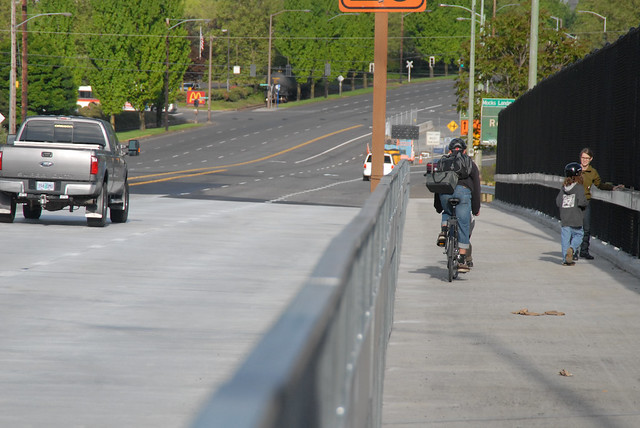
largely the result of advocacy from the Swan Island TMA.
Lindsey Walker, employee outreach coordinator for the Lloyd District group Go Lloyd, called Metro’s decision Friday “kind of a surprise” and “certainly a hit” but said her organization would be able to continue its services thanks to a share of revenue from parking meters and local tenants.
Heather McCarey, executive director of the Washington Park TMA, said Friday that her organization would be able to launch an in-park shuttle as planned this summer, but would be unable to market that and other car-free transportation services to the extent planned.
McCarey, whose organization competes for funding with the Swan Island TMA, said that TMA has served too valuable a public purpose to not receive any public funding.
“It is a lot of work and years — years! — of relationship-building and work that was put in,” said McCarey. “And how are we capitalizing on that, by not supporting Swan Island? I’m not necessarily thinking that they should be expected to live on their own. I think that they should get support.”
Swan Island Business Association Director Sarah Angell, who currently functions as the TMA’s sole staffer, said her office was unlikely to survive without Metro’s grant.
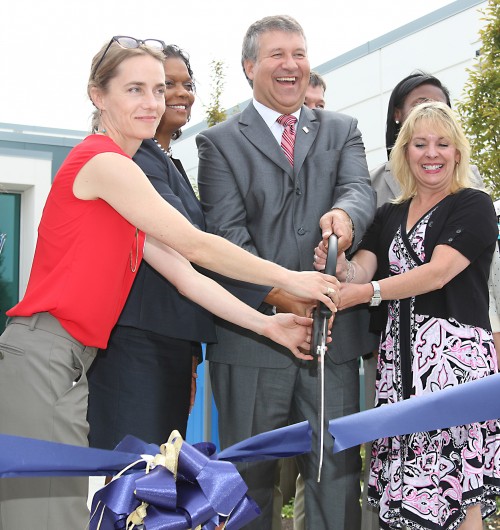
in 2014 for the opening of a new trades center
on Swan Island.
(Photo: PCC)
“For Swan Island, this means the TMA likely will close after 15 years at a point when the island heads into an unparalleled stretch of employment growth, with thousands of new employees and students seeking access to trades and industry training,” she said.
The decision from Metro’s Regional Travel Options Committee, which has yet to be formally ratified by Metro’s council, comes as Daimler Trucks North America is building a $150 million expansion to its Swan Island headquarters that is about to add 1,000 or more new employees to the area’s workforce of about 11,000.
Last fall, Portland Community College opened a new trades center in the park, with 650 students learning industrial skills. Other major employers include UPS, Vigor Industrial and Columbia Distributing.
Swan Island is served by one six-lane road with a barrier-protected sidewalk, by two TriMet bus lines and by two bike routes — one legal but unfinished, the other illegal.
Advertisement
Swan Island’s TMA has been the leading advocate and defender of all those resources. Its staff of one to two people led efforts to add the sidewalk barrier, successfully lobbied to create TriMet’s No. 85 bus and Swan Island Evening Shuttle, protected the bus lines from cuts that would have thrown their schedules out of sync with Swan Island employers, and championed new infrastructure like the riverfront trail that has become a bike-to-the-beach destination near the heart of the city.
Angell’s predecessor Lenny Anderson has been a board member and significant advocate for the North Portland Greenway, a planned riverside path from the Rose Quarter to the Columbia River, running through Swan Island.
The results of all this advocacy have been difficult to measure; the Census does not track commute modes for areas of Swan Island’s size.
From 2002 to 2009, Census surveys showed the share of workers commuting to Swan Island from nearby ZIP codes fell slightly, from 10.7 percent to 10.1 percent — but commuters to the nearby Rivergate Industrial Area fell five times faster, from 14 percent to 11 percent.
“Where can you find in Portland a more diverse workforce?” Angell said. “These are the hardest working people in the Portland area, who used to live close in and now live in the outer east neighborhoods.”
Daimler, one of the area’s few white-collar employers, has emerged as a major hub for bike commuting. Last September, its employees logged 27,108 miles biked during the Bicycle Transportation Alliance’s annual commute challenge, more than any single company in the state.
In December, we wrote a Friday Profile of Daimler’s Kyle Carlson, who was personally responsible for 1,144 of those miles last fall — 50 a day, the most in the state last year. Here’s Carlson, posing outside the free, secure and covered bike parking area that Daimler opened in 2013 after years of advocacy by the employee bike committee that has long been nurtured and assisted by the Swan Island TMA.
In our profile, Carlson explained how biking to work has become one of the most important things in his life. He’s dropped 100 pounds since starting to bike to work during the commute challenge several years ago.
The Bike Commute Challenge was one program that will be funded by Metro in the 2015-2017 grant cycle. The BTA learned Friday that it had been funded to create a full-time coordinator for that project.
However, it wasn’t just the challenge that enabled Carlson’s commute shift. As he explained in our profile, Carlson would have been unlikely to continue beyond the commute challenge if not for a map posted in the Daimler common area that helped him find someone else with a similar bike commute.
Carlson said the colleague he met through that map, Steve Taylor, became both a good friend and his most important inspiration in starting to bike to work rather than drive.
Angell confirmed on Friday that the ride-matching map had been posted as part of her advocacy in support of Daimler’s bike commuters.
Correction 8:54 pm: A previous version of the story incorrectly described the nature of the shuttle within Washington Park. It also understated the 2002-2009 increase in long commutes to the Rivergate industrial area.

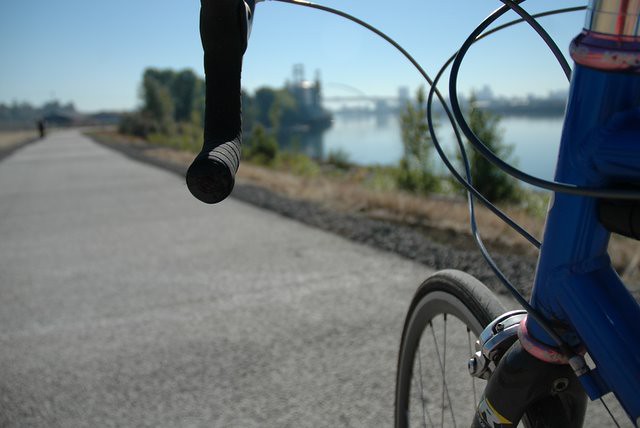
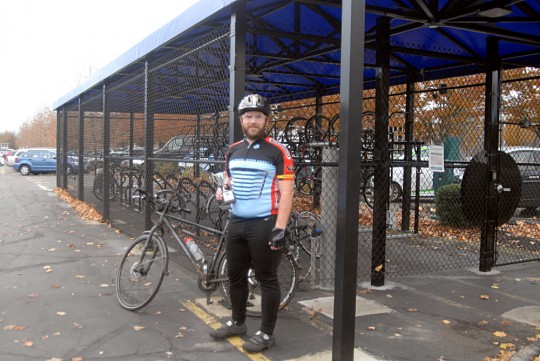
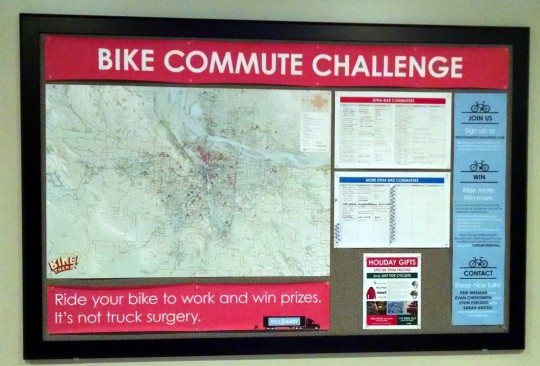
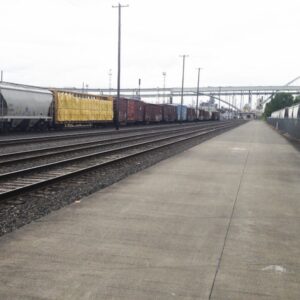

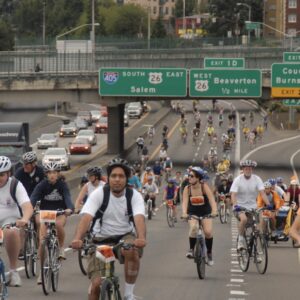
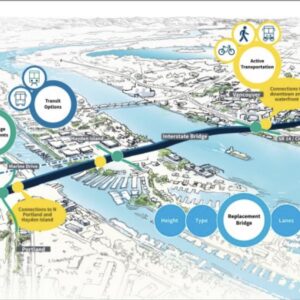
No where else in the region are there so many good jobs so close to thriving neighborhoods, especially manufacturing and traded sector jobs.
For a booming Swan Island to work demands that products, parts and people all get in and out of the area via one road, Going Street. While the Port of Portland and PBA fret about congestion and moving freight, the Swan Island TMA has for 15 years demonstrated exactly how to do that. Get two employees to bike, use transit or share the ride, and you make room for a fully loaded semi. It works, and cost little, but apparently too much for Metro’s Regional Travel Options committee. It boggles the mind that Metro, which has put economic development on its agenda, walks away from the most successful and cost effective “freight moving” project in this key regional employment area.
Time for the City of Portland, Port of Portland to step up and for Metro to revisit their calculations on what “Makes a Great Place!” Jobs that people of every race and ethnic group can get to without a car!
Note: I founded the Swan Island TMA in 2000 and retired Dec. 31, 2013.
Lenny, thanks for all your hard work over the years. I’m a Daimler employee who bikes into work sometimes, and I really appreciate the Going St. path.
Now all we need them to do is build the North Portland Greenway. I used to take cement road south until being stopped by an officer once. It was the best part of my commute, it was quiet, you could hear the birds and all of UP’s employees were friendly, one even warned me one time of the officer staking out the train yard.
Now I take Greeley, and it is now the worst part of my commute. Even getting up to it sucks, you either have to fight the 50 mph traffic on Going to get to the slip lane to Greeley (Hint, if you activate the pedestrian crossing at the McDonald’s, and you push it HARD up the hill, you can get to the slip lane before the Going traffic catches up to you). I HATE HATE having to take Greeley. Having traffic buzz by you at 55mph+ (signed 45mph, but I drive it too, the average speed is around 53mph) with no barrier between you and the cars is just stupid, insulting and dangerous.
I hope the Swan Island TMA can continue to exist so that they can continue to support Swan Island and advocate for everyone to have a safe route no matter what mode they are using.
We can thank everyone who voted for Tom Hughes. He made if very clear from the beginning that he wanted metro resources shifted. Noticed how the WTA is still funded (we was formally the mayor of Hillsboro). Next time, if everyone would step up and actually vote then we could avoid things like this in the future.
To be clear: this Metro funding is required by the feds to be spent on peak-hour trip reduction. It’s just being granted to other organizations than the TMAs. I’ll edit the post to make this clearer.
is that trip “count” reduction or trip “mode” reduction or simply trip “congestion” reduction. My hunch is that it is simply rush hour “congestion” reduction, which could be used for road widening, or other. This is a federal policy and I have a hard time believing that states like TX would have it any other way.
I believe it’s CMAQ and STIP funds to be precise, so ultimately congestion-oriented. Pretty sure Texas usually uses them to add turn lanes, while Metro has long used them for trip reduction and mode shift.
Metro declined comment Friday so it was hard to get full info on the context here, but I think we would have heard about it before now if Metro’s trip-reduction program were changing substantially in size or in approach. I’m hoping to learn more today.
the right tool for the job ..first pic:
looks like cutting yellow caution tape with bolt cutters
is as effective as cutting bolts with scissors 🙂
That must be the latest 3M formulation, flexible, but tough as bolts!
I guess METRO thinks since Portland has reached bike “Platinum” so time to move on to invest in the next low cost transportation option….which is?
Will it be Mini delivery trucks (like the Ford Transit) that one can live in, commute in and then work from? Its a rare triple score!!
Or is this a reshuffling of the deck chairs so that more gas taxes (etc.) go into roads? [These are all my un-informed guesses…as I am on vacation this week.]
Metro wants light rail over less costly buses.
When you have defenseless taxpayers for your piggy bank, why not?
I’ve worked for ‘a major manufacturing company’ both at the North and South sides of the ‘island.’
Biking or walking on Swan Island is shitty. Most employees don’t care or bitch about the bicyclists ‘taking up a whole lane.’ The narrow, steeply graded sidewalk on Going is dangerous for bicyclists and pedestrians. It’s not going to get better so long as everyone that works there commutes from the ‘couve or Gresham.
I feel bad for Sarah and Swan Island TMA, but the problem is more systemic than anything else…. The fact is that most of the employees of my employer and other companies on the island don’t generally hire a lot of employees from N Portland. The vast majority of the engineering staff and blue collar workforce commute from the suburbs because of cost, quality schools and the fact that the workforce in PNW is very nepotistic– eg you have to be related to or be friends with someone that works there to get hired.
If you get more local employees, you get more bike commuters, and you get more vocal bike advocates.
Just getting to that sidewalk sucks. There is absolutely no speed enforcement down here and very few safe places to be down on the island unless you are in an armored car.
priorities over funding?
TMA’s are actually about “doing” active transportation. Metro is about “planning” for active transportation. Metro should reduce its own planning activities to fund actual work.
Swan Island is home to 10,000 jobs and growing. at the same time there is only one motorized access and two less than optimal routes for cyclists and pedestrians. Without SITMA there would be zero. Intra-island safe routes are starting to happen too. Going to the river, Captains walk, New structure around the under construction Daimler HQ ( who will be seeing another 1000 employees on site when completed.)SITMA hjas been a strong player in the npGreenway trail advocacy and shares that vision of connecting the jobs, nature and community along the alignment of the planned trail.
The mantra two cars = one truck has long been tossed around on the island. With access available only for the very confident rider, how long will Swan Islands economic engine continue before the cost of congestion forces business out?
I sincerely hope Metro reconsiders. And a nice letter or phone call to Councilors are in order.Sam Chase has Swan Island in his district. But all Metro Council needs to hear.
“workers commuting to Swan Island from nearby ZIP codes fell slightly, from 10.7 percent to 10.1 percent — but commuters to the nearby Rivergate Industrial Area fell five times faster, from 10.7 percent to 9.2 percent.”
Isn’t this less than three times faster, not five times faster? Or did it fall to 8.2 percent?
Good catch, Evan. It was a transcription error on my part: should have been 14 percent to 11 percent for Rivergate. Fixed, with source data here:
https://docs.google.com/a/portlandafoot.org/spreadsheet/ccc?key=0AtsiMKlWupv0dGJuaVJnc1JXSmVjMTZZYTEyX0RFNFE&usp=drive_web#gid=5
I work on Swan Island and used to bike almost every day. Now I have a baby who I take to day care on the island and am realizing that that presents the ultimate challenge for good biking infrastructure. What we have is not safe enough, so I now drive everyday.. 🙁
Don’t blame you…would never expose a child to this hostile commute environment.
Shame on Metro. I would encourage publications like Bike Portland, WW, and others to look at the $4.5 budget given to Metro to administer these grants and see how much is eaten up in overhead. How much are the people at the top talking about process, planning and metrics truly contributing to the cyclists, pedestrians and other actually using the street networks? I think little. Metro needs to fund these TMAs and the City does too. People do not realize that these organizations are really, really cheap to operate and every public dollar is stretched by the good people living and working in the local district. If you want something done, get a TMA involved and it will get done cheaply and quickly. Want a 30 year plan that costs a ton done by planners with nice retirement/benefits which sits in a bookcase, call Metro.
Thanks for all the years of hard work Swan Island TMA!
P.s. Rode the cement road this morning on to the island…. Greeley is suicide.
As noted in the article and in the comments, thanks to the SITMA, the cycling infrastructure on the island has greatly improved in the 4 years that I have worked there. However, there is still much more to be done and this is especially dire due to increasing population of workers there.
The new Daimler building is just one example of how Swan Island will continue to grow as a popular work location for all types of workers as Portland densifies and changes demographically. It is only a 15 minute bike ride from downtown or North and NE Portland, so it would be very easy for workers to get to and from their homes if the proper infrastructure were there. If folks have to ride on Greeley with 50 mph traffic buzzing 2 feet away from them or ride on the narrow, broken, and/or non-existent sidewalks on Swan Island they will just drive.
Not continuing to improve the cycling infrastructure and discontinuing local support for all other types of non-single occupancy vehicles means not only more congestion on Swan Island, but also along the path of their commute, including downtown and I-5. Obviously, this leads to large negative externalities (traffic congestion, poor air quality, global warming…) that greatly outweigh the small taxpayer cost to keep the SITMA running.
I sincerely hope that the SITMA is able to find the funds to continue operating. Sarah and Lenny’s efforts have positively affected me, my coworkers, and the Overlook and other nearby neighborhoods. It would be a shame to lose this resource when there is still so much more to do and an existing and efficient means to get it done.
This is a real shame. Portland has such a fantastic cycling infrastructure everywhere except Swan Island, and the Swan Island TMA is the only dedicated voice we have. Daimler is home to a huge number of daily bike commuters that funnel in from every area of Portland. The opinion is unanimous… Swan Island needs help! It is by far the most dangerous part of every commuter’s ride. The SITMA was on track to make huge strides in years to come.
Every year, more and more employees become bike commuters on Swan Island. Unfortunately, I believe it will start shifting the opposite direction without a dedicated Swan Island advocate like Lenny and Sarah.
Major Swan Island land users like Daimler, Vigor Industries, UPS, FedEx etc. should band together and fill whatever budgetary gap Metro claims there is to keep our TMA running. We need someone like Sarah Angell, who has done a very good job over the years, to continue being a voice of the two wheeled commuter. Without her working on a continues bike/walk path along the river from Daimler to the Esplanade, this dream of ours is going to be delayed for years. Heck, Daimler should hire Sarah as an independent, being responsible for keeping Swan Island save for all commuters, two or four wheeled, using public transportation or private conveyance !
That could happen! But to be clear, as the story notes, the land users you mention are already covering 41 percent of the nonprofit’s budget.
Just curious… what is the actual funding amount we are talking about? How much does it cost to run the SITMA?
Good question – I should have gotten this in the post but didn’t because I was in a hurry. Last cycle’s two-year RTO grant to SITMA was $123,316.
SITMA is a critical element to the safety and the future of those wishing to do active transportation to Swan Island. It kills me that our TMAs
Have to work in such volatile funding conditions. As a business partner of SITMA we support them and hope for the best for this agency and it’s future.
That a shame I bike to swan island almost daily. I see lots of great improvements, but they are only half way done. who is going to be our voice for the future. That’s not a step in the right direction.